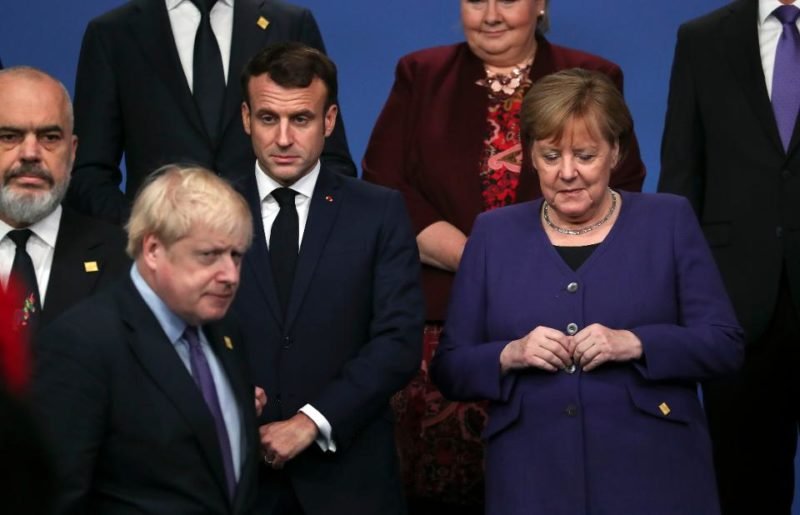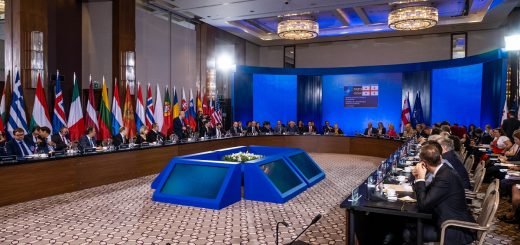European Appeasement Is Alive and Well

EXECUTIVE SUMMARY: The word “appeasement” evokes dark memories of the Munich 1938 agreement, in which Britain and France made far-reaching concessions to the aggressive German Nazi state in order to avoid violent conflict. The betrayed victim was Czechoslovakia, which was not even invited to the conference at which its fate was to be decided. The outbreak of WWII in 1939 showed, of course, that the agreement was a gross error in judgment. Sadly, the West does not appear to have learned much from Neville Chamberlain’s misguided proclamation of “peace in our time”.
The reality that antisemitism is an integral part of European culture is not the only issue dividing the EU and Israel. There is also the serious problem of chronic and habitual appeasement, though it is not often identified as such.
The quintessential example of Western appeasement in recent years was the 2015 nuclear agreement forged by the Obama administration with the Islamic Republic of Iran (known as the Joint Comprehensive Plan of Action, or JCPOA). The four other members of the Security Council plus Germany all signed this flawed agreement alongside the Americans. The pact, which was ostensibly intended to keep nuclear weapons out of the hands of Tehran’s Islamist regime, allowed it to continue to design and test missiles and develop advanced centrifuges.
Israeli PM Benjamin Netanyahu appeared before the US Congress to protest the agreement—a highly unusual and undiplomatic act but justified under the circumstances. Obama was appeasing an aggressive and hostile Iranian regime that made (and continues to make) unceasing threats to destroy the State of Israel.
Just as with the Munich agreement of 1938, it was others who were expected to pay the price for the JCPOA. The agreement freed Iran to unleash terrorism and subvert regimes across the Middle East in pursuit of its own hegemonic aspirations, which it has done ever since. After Donald Trump took office as president, he withdrew from the agreement, but the Europeans are still desperately trying to hang on to it.
An unabashed spokesman for European appeasement of Tehran is Josep Borrell. This socialist former Spanish FM was recently appointed High Representative of the EU for Foreign Affairs and Security Policy. He said, “Iran wants to wipe out Israel, nothing new about that; you have to live with it.” In 1938, the British and the French saw the destruction of Czechoslovakia as a reasonable price to pay for their own skins. Today Borrell employs a similar logic about Israel.
A second major issue, which embodies many elements of appeasement, is the European attitude toward the Palestinian-Israeli conflict. The EU has promoted the so-called “two-state solution” for many years. This pipe dream claims that a peace agreement will lead to a democratic Palestinian state living in peace beside Israel. There may one day be a signed document labelled a peace agreement, and a Palestinian state may well come into being. But the chances that it will be genuinely democratic or peaceful are close to nil. It will probably be a repressive, terror-sponsoring entity that may well turn out to be a failed state.
To sustain the illusion of an eventual peaceful, democratic Palestinian state, the Europeans have no choice but to deliberately avert their eyes from basic facts. One is that there were free elections in 2006 in the Palestinian territories. To whom did the Palestinians give a majority? A genocidal Islamist movement, Hamas. The only other significant group, Fatah—the largest constituent group of the PLO, the world’s foremost terrorist group—follows a “pay for slay” policy that remunerates terrorists or their families for the murder of Israeli citizens.
The Netherlands financially supports the Fatah-controlled Palestinian Authority (PA). In the framework of its “pay for slay” policy, the PA has paid out more than $900,000 to the terrorists who killed 15 people in a Jerusalem pizzeria in 2001. Among the victims were five members of a family of Dutch immigrants.
The arch-appeaser Borrell favours recognizing “Palestine” right now, though the PA is far from democratic. When the EU could not agree on a common response to the recently announced Trump peace plan, Borrell came out with his own statement. He warned that the agreement may lead to violence, a typical appeaser’s remark.
A third major case of appeasement concerns domestic affairs in various European countries. The EU claims that its member states are subject to the rule of law. Yet several member states—France and Sweden come to mind—have contained ghettos of mainly Muslim immigrants for many years. Several of these are “no go” areas that the police and other authorities rarely enter. (The authorities also ignore gang criminality, though that does not apply only to Muslims.)
A major wave of attacks on Jews erupted in France toward the end of 2000. Prominent French sociologist Shmuel Trigano has said there are convincing indications that the Jewish community was asked at the time by the socialist Jospin government not to give much publicity to the sharp increase in anti-Jewish aggression so as not to “put oil on the flames.”
The centre-right politician Nicolas Sarkozy, who replaced socialist Daniel Vaillant as interior minister in May 2002, admitted that there had been a surge in antisemitic violence. Yet centre-right president Jacques Chirac flatly denied that antisemitism existed in France until as late as November 2013.
In an attempt to disabuse Chirac of this absurd fantasy, a delegation from the Simon Wiesenthal Center met him at his Paris palace in May 2013. The organization’s dean, Rabbi Marvin Hier, related:
The French president told us that there was no antisemitism in France; it was some young hooligans who had attacked Jews. We replied that many French Jews—particularly in the Parisian suburbs and provinces—had told us different stories and that there was substantial antisemitism in France. …It was a tough conversation, and in the end we agreed to disagree on all the major points. President Chirac said he would fight whole-heartedly to prevent antisemitism in France, but that it was not there. After we left the Elysée Palace, we went to a reception at the home of Baron de Rothschild. Two of our group missed the bus and took a cab. They wore skullcaps, and were right outside Baron de Rothschild’s home when a few people started insulting them, saying things like, “Get out of France, you Jews.” That was an “eloquent” answer to Chirac’s vain claim that there was no anti-Semitism in France.
In 2004, Trigano had said:
The official version propagated by the Jospin Government can be summarized by saying that if Jews were attacked, this was not antisemitism, but a reflection of a social problem. The socialist policy aimed, with this mechanism, to obscure the terrorist menace against France. This resulted in the Jews seeing themselves as the country’s scapegoat and safety barrier—as they had received the main blows, which targeted French society at large.
Almost a decade later, the Jews were still paying the price for French appeasement.

It was not lost on Muslim youngsters that the French authorities were unwilling to confront criminality. In the 2005 autumn riots, youngsters–almost all Muslims—laid siege to French society for weeks on end. Over 9,000 cars were torched. Kindergartens, schools, shops, libraries, and a theatre were burned. Eighteen religious institutions were attacked, including three mosques and two synagogues.
What European leaders do not wish to realize is that the price of their appeasement of that part of the Muslim population that does not want to integrate and/or follows extremist currents will ultimately be paid by the Europeans themselves.
Unlike in Europe, Israel cannot afford to appease its enemies. It can delay a campaign against Hamas in Gaza for some time, but not forever. For Israel, the price of appeasement is prohibitive.
This article originally published by BESA Centre


















